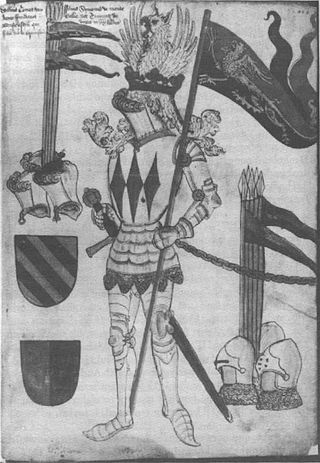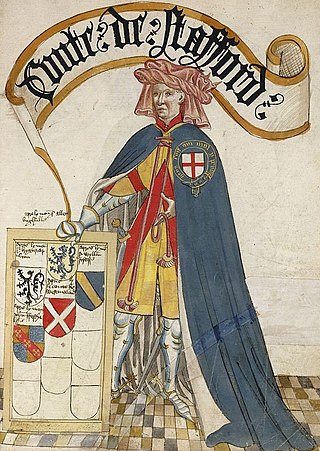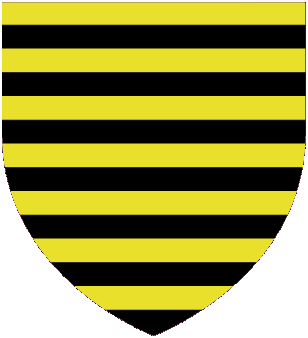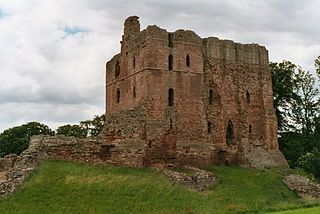Career
He is mentioned among the advocates in the ‘Year Book’of Edward II. He received a commission of oyer and terminer on 22 February 1327 and in the two following years. In 1331,when he had risen to the rank of king's serjeant,he was appointed with others to assess a tallage in Oxfordshire,Gloucestershire,and Berkshire (25 June). The following year he was one of the council selected by the king to advise him and was ordered on 11 October to attend the approaching parliament in Scotland for the confirmation of the treaty with Edward Balliol. He was made a Knight of the Bath. [2]
Judge
On 20 March 1333,he was made a judge of the King's Bench,but was removed to the Common Pleas on 30 May following. He was on assize at York in 1339. On 30 November 1340,Edward III returned from the Low Countries and removed the chancellor,treasurer and other prominent officials,among them Shareshull,on a charge of maladministration.
He was reinstated on 10 May 1342 and on 2 July 1344 he was made Chief Baron of the Exchequer. On 10 November 1345,he was moved back to the Common Pleas,with the title of second justice. He was appointed one of the guardians of the principality of Wales during the minority of the king's son. In 1346 he was styled “councillor and kinsman”of William de Montagu,Earl of Salisbury. [3]
Chief judge
On 26 October 1350,he was advanced to the headship of the Court of King's Bench and presided over it until 5 July 1357. While holding that office he declared the causes of the meeting of five parliaments,from 25 to 29 Edward III (1351–1355). His functions seem to have more resembled those of a political and parliamentary official than those of a judge. [2]
In 1358 Shareshull,Edward de Montagu,and two others,executors of Elizabeth de Montagu,Countess of Salisbury,sued John Runaway in the Court of Common Pleas regarding a reasonable account of the time he was Elizabeth's bailiff in Worksop,Nottinghamshire and her receiver of money.
In the last year of his chief justiceship,he was excommunicated by the Pope for refusing to appear when summoned to answer for a sentence he had delivered against Thomas Lisle,the Bishop of Ely for harbouring a man who had slain a servant of Blanche,Lady Wake. [2]
In 1344 some sailors thought Shareshull (there called Sharford) stayed too long at dinner when he was holding assizes in that town. One of them mounted the bench and fined the judge for non-attendance. He took such offence at the joke that he induced the king to take away the assizes from the town and took the liberties of the corporation into his own hands for about a year.
Retirement
Though retired from the bench,he occupied confidential positions as late as 1361. He lived beyond 1364,in which year he granted his manor of Alurynton in Shropshire to Osney Priory,in addition to lands at Sandford in Oxfordshire,which he had given seven years before. He was a benefactor to the priories of Bruera,near Chester and Dudley. He left a son of the same name. [2]

William Montagu, alias de Montacute, 1st Earl of Salisbury, 3rd Baron Montagu, King of Man was an English nobleman and loyal servant of King Edward III.

Ralph de Stafford, 1st Earl of Stafford, 2nd Baron Stafford, KG, of Stafford Castle and Madeley Castle in Staffordshire, was an English nobleman and a notable soldier during the Hundred Years' War against France.
The Chief Baron of the Exchequer was the first "baron" of the English Exchequer of Pleas. "In the absence of both the Treasurer of the Exchequer or First Lord of the Treasury, and the Chancellor of the Exchequer, it was he who presided in the equity court and answered the bar i.e. spoke for the court." Practically speaking, he held the most important office of the Exchequer of Pleas.

The titles Baron Montacute or Baron Montagu were created several times in the Peerage of England for members of the House of Montagu. The family name was Latinised to de Monte Acuto, meaning "from the sharp mountain"; the French form is an ancient spelling of mont aigu, with identical meaning.

Sir William de Thorpe was an English lawyer who was Chief Justice of the King's Bench from 26 November 1346 to 26 October 1350. As a clerk of this court, he was assaulted on one occasion in 1318, when his enemies allegedly urinated on him. He was knighted in 1345, at the same time as he was made justice of the King's Bench.

William Edington was an English bishop and administrator. He served as Bishop of Winchester from 1346 until his death, Keeper of the wardrobe from 1341 to 1344, treasurer from 1344 to 1356, and finally as chancellor from 1356 until he retired from royal administration in 1363. Edington's reforms of the administration – in particular of royal finances – had wide-ranging consequences, and contributed to the English military efficiency in the early stages of the Hundred Years' War. As Bishop of Winchester he was responsible for starting an extensive rebuilding of Winchester Cathedral, and for founding Edington Priory, the church of which still stands today.
Simon Montacute was a medieval Bishop of Worcester and Bishop of Ely.

Robert Ufford, 1st Earl of Suffolk, KG was an English peer. He was created Earl of Suffolk in 1337.

Sir Thomas Grey or Gray of Heaton Castle in the parish of Cornhill-on-Tweed, Northumberland, was the son of Sir Thomas Grey, an eminent soldier in the Anglo-Scottish wars in the reigns of Edward I and Edward II, and his wife, Agnes de Bayles. He was the author of the English chronicle, the Scalacronica.
Alice of Norfolk or Alice of Brotherton was an English noblewoman. She was the daughter of Thomas of Brotherton, and a granddaughter of King Edward I of England. She married Edward Montagu, 1st Baron Montagu.

William Montagu, 2nd Baron Montagu, was an English peer, and an eminent soldier and courtier during the reigns of Edward I and Edward II. He played a significant role in the wars in Scotland and Wales, and was appointed steward of the household to Edward II. Perhaps as a result of the influence of his enemy, Thomas, 2nd Earl of Lancaster, Edward II sent him to Gascony as Seneschal in 1318. He died there in October of the following year.
Adam Houghton, also known as Adam de Houghton, was Bishop of St David's from 1361 until his death and Lord Chancellor of England from 1377 to 1378.
John Gernoun, or Gernon was an Irish landowner, soldier and judge who held office as Serjeant-at-law (Ireland) and Chief Justice of the Irish Common Pleas. He gave good service to the Crown during the Scottish Invasion of 1315-18, but as a judge, he was accused of injustice.

Sir William de Notton, or Norton was an English landowner and judge, who had a highly successful career in both England and Ireland, culminating in his appointment as Lord Chief Justice of Ireland in 1361.

Sir Richard Arches, of Eythrope, in the parish of Waddesdon, Buckinghamshire, was MP for Buckinghamshire in 1402. He was knighted before 1401.

William Montagu, 2nd Earl of Salisbury, 4th Baron Montagu, King of Mann, KG was an English nobleman and commander in the English army during King Edward III's French campaigns in the Hundred Years War. He was one of the Founder Knights of the Order of the Garter.

Thomas de Dent, Thomas Dyvelyn, Thomas Denton, or Thomas of Dublin was an English-born cleric and judge who held high office in Ireland during the reign of King Edward III, and was praised as a diligent and hard-working Crown official, who damaged his health through overwork.

John FitzWalter, 2nd Baron FitzWalter was a prominent Essex landowner best known for his criminal activities, particularly around Colchester. His family was of a noble and ancient lineage, with connections to the powerful de Clare family, who had arrived in England at the time of the Norman conquest of England. The FitzWalters held estates across Essex, as well as properties in London and Norfolk. John FitzWalter played a prominent role during the early years of King Edward III's wars in France, and at some point, FitzWalter was married to Eleanor Percy, the daughter of Henry, Lord Percy.












